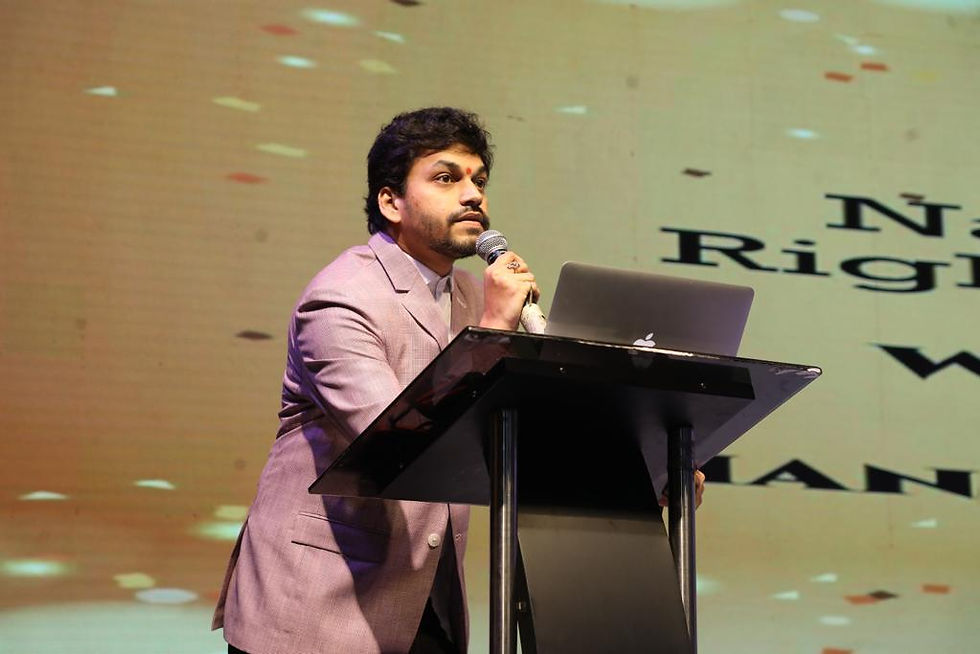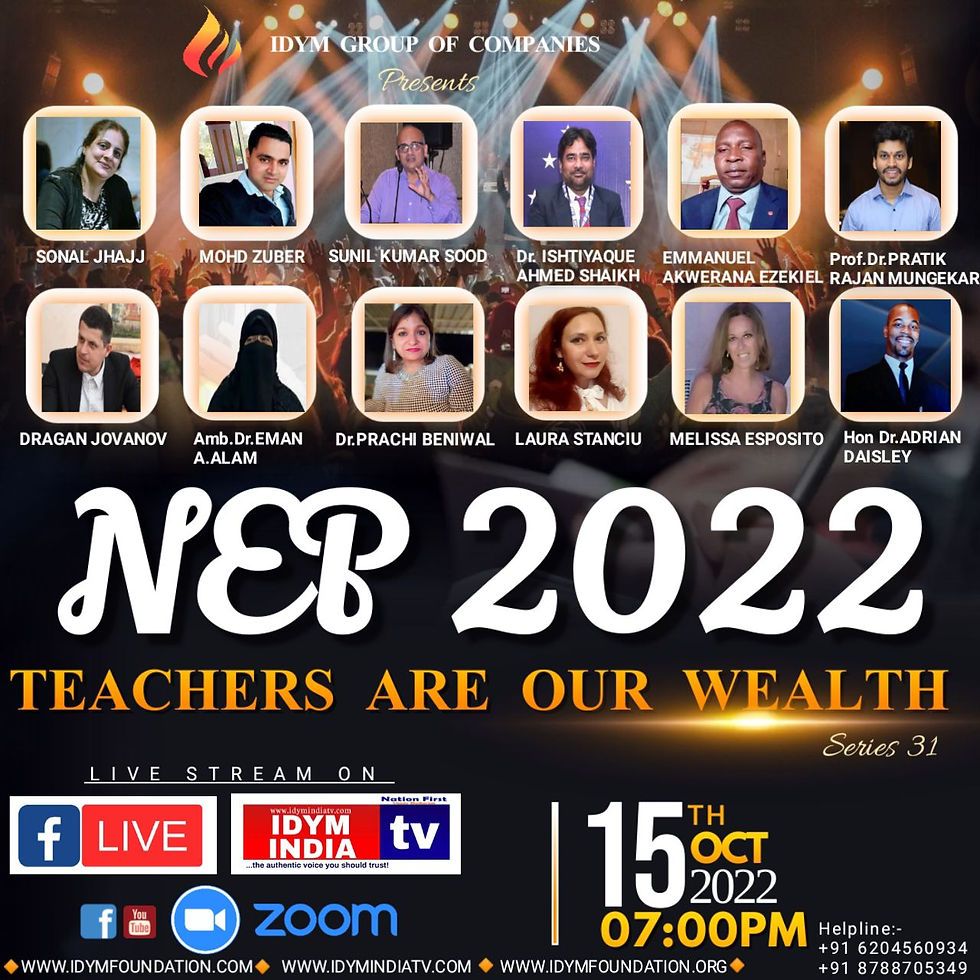Each profession occupies a specific niche in society doctors heal, engineers design, and bankers handle our money. Teaching, however, stands out as a subsumptive entity. At a preliminary stage, teachers instill the transcendent faculties of communication, decision-making, and awareness of social responsibilities. Later in life, no matter which field we choose to pursue, we again turn to teachers for training. A strong information base and well-developed capabilities of comprehension and analysis are critical for progress. These crucial responsibilities of inculcating knowledge, kindling inspiration, and encouraging creative thought are all vested in the teacher. Keeping in mind the increasing trend of both parents working long hours, the teacher is also expected to build a strong moral character and provide emotional support. Thus, the teacher has to build a rapport with the student and be simultaneously approachable and authoritative. His/her role encompasses that of an instructor, friend, role model, and confidant.

When more than 92,000 elementary schools in the country are still functioning with no teachers, and many more secondary schools have teachers who are not qualified or trained, where and how do these reforms begin? It is obvious that the first step towards correcting such deficiencies is to strengthen teacher training programs. We need to launch a massive drive in this regard at all levels.
We need to realize that a school can still exist without benches and desks; or without a blackboard and chalk. It can survive even without playgrounds and classrooms. But it cannot function without teachers. There are schools conducted under trees, in temples, and in dilapidated hovels in many parts of rural India. They have survived and their pupils have walked miles on country trails or sailed in makeshift boats to reach them because there is a village teacher teaching in those schools. Even parent-teacher schools in cities where the public took over the management, with parents themselves donning the role of teachers, have done well in this respect. Today’s online classes, where parents supervise their children’s schooling, is a good example of education being imparted without even a school.
If the policymakers visited such schools before framing their policies, a completely different picture would have emerged. What looks grand on paper or what is discussed, debated, and decided in high-level meetings or glittering assemblies is a far, far cry from that makeshift shed in the country’s rural areas where a single, helpless, unqualified teacher struggles to maintain a scholastic atmosphere in a “class” of kids of varying ages with no books, or teaching aids or even basic necessities like drinking water. Teachers’ Day is a good day to remember and salute these abandoned gurus.

Teaching is a craft that must be learned and polished from time to time for improved results. Teachers can get rusty with the passage of time unless they keep in touch with the latest methodologies and teaching techniques. These recommendations were meant to put an end to the widespread frustration and discontent among those teachers who were qualified for the job as opposed to the thousands of untrained ones who were absorbed into the system in a haphazard way. If these reforms are put in place today, along with a code of conduct for teachers, teaching standards will certainly improve. Much depends, however, on the method of implementation.
For example, who is to judge a teacher’s performance in a class? The head of the institution? Her colleagues? Or, worse, a government inspector? The answer is obvious. A teacher’s pupils are the best judges of her capabilities. Their performance in tests and examinations points to the kind of coaching they received in class. Student evaluation of teachers is an integral part of foreign universities. In India, student performance in tests and exams should be evaluated carefully towards this end.
Again, peer evaluation is highly prized in other countries, although it may not work in this milieu. Even merit-based selection of teachers will invite opposition from many quarters, which is why the Commission’s recommendations could not be properly implemented. However commendable, they have been difficult to implement, especially in government or government-aided private schools.
If at least, it is generally agreed to establish a national system of school education with high and uniform standards of excellence in its teachers, that should be the first step in recognizing the importance of good teaching. Teachers of merit and competence alone can generate meritorious students.
I often wonder about teachers who educated famous people such as Einstein and Abraham Lincoln. Were these teachers specially qualified to inspire their students to achieve fame and success? Or were these teachers just plain lucky to have talented students? Do some teachers have rare qualities of turning them into gold? The answer may not be easy to find. A great person once saidTeaching is a profession that teaches all other professions. Since ancient times, teachers have been playing an important role in our society. Behind every successful engineer or doctor, there is a teacher. A teacher is a person who molds them into engineers or doctors. A person who teaches us moral values, a person who encourages us is a teacher. In Indian culture, we praise teachers more than Gods. Alexander the Great once saidI am indebted to my father for living, but to my teacher for living well.
The role of teachers in society is both significant and valuable. They are one of the main pillars of a sound and progressive society. They bear the weight and responsibility of teaching, and, apart from parents, they are the main source of knowledge and values for children. It is rightly said that a teacher plays a key role in shaping our future. Nowadays, being an engineer or a doctor is considered good, but they would not have been able to get where they are without teachers. Teachers share the information they have. On the contrary, doctors and engineers do not necessarily share theirs. Right from the age of four, a child finds himself in the hands of a teacher. Throughout our lives, our teachers inspire us and teach us about values. They treat us like their own children and make us learn from their experiences. They make us strong enough to stand on our own feet and face any challenge. No engineer or doctor can ever replace a teachers contribution to our lives! A good teacher is like a candle it consumes itself to light the way for others.
Lastly, I would like to congratulate Er. Ravi Shankar, Sonal Jhajj & all the team for their constant support, love & dedication.
About Dr Pratik Mungekar
1) He is the first Indian to be appointed as the planetary Minister of Sustainable Development of Newly emerging The Kingdom of Atlantis (a Decentralized Sovereign kingdom)
2) He is the first youngest Indian whose book Introduction to sustainable Development Goals (Non-Academic) is now part of the Atlantean Education program.
3) He is the first youngest Indian to receive 250+ Honorary Doctorates from all over the world.
4)He is the first youngest Indian professor who taught more than 8000+ Students & Career guided 4000+ Students to date & the count is still on.
5) He is the first Indian who has 700+ International, National & State Awards at the age of 28 for his contribution to the field of Teaching & Research.
6) He is the first youngest Indian to receive 125+ Honorary High Degrees across the Globe.
7) He is the first Indian to be appointed by 35+ International organizations in various High-positions at the same time.
8) He is the first youngest Indian to be appointed as an Ambassador by 36 organizations of many countries in almost all disciplines.
9) He is the first Indian youngest professor to start teaching at the age of sixteen, the age of twenty Seven He has completed twelve years of Teaching.
10) He is the first Youngest Indian to receive Royal &Prestigious Titles such as 1)Lecturesall-round Magnificus (L.M.), 2) H.R.H. 5* Duke.
11) First Youngest Indian to receive Mendeleev’s Fellowship ( United Kingdom’s Highest Academic Honour).
Today, the name of Prof. Dr Pratik Rajan Mungekar is no longer common but is emerging as a distinguished Scientist, Professor, World Educationist, Published Writer, Counsellor, Social Worker and an International Speaker
Instagram Id:
Facebook id:

Comments